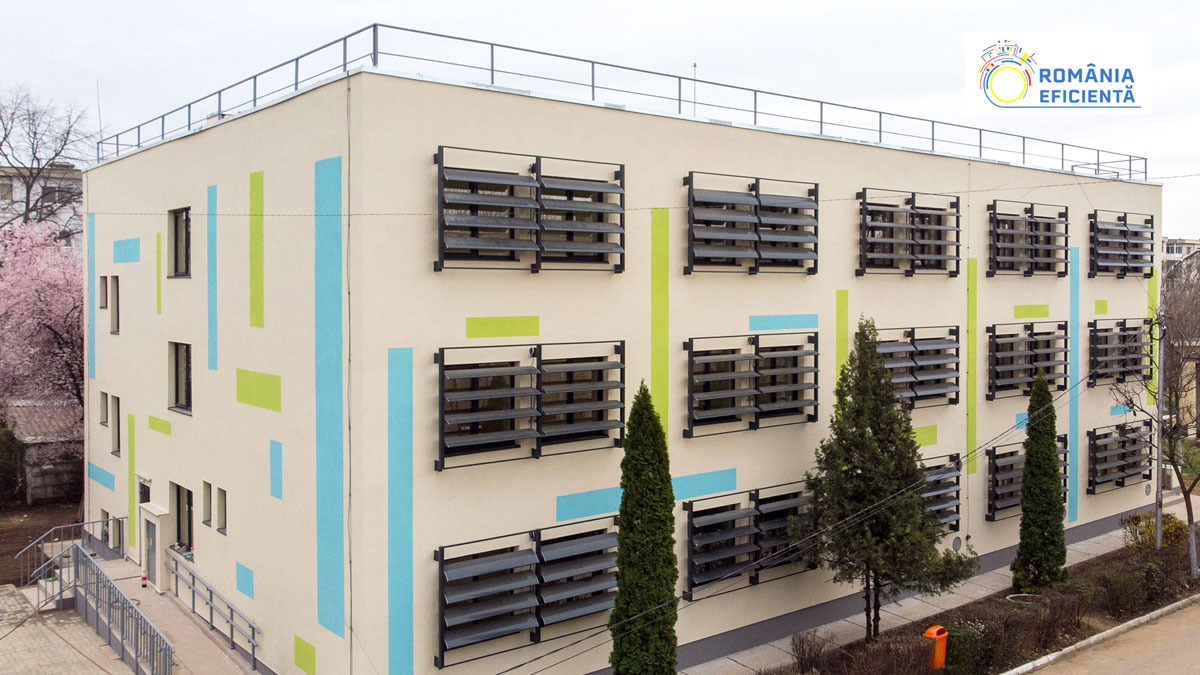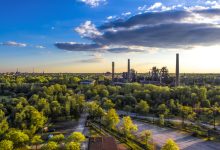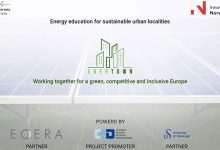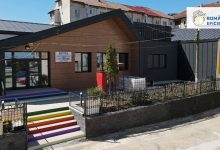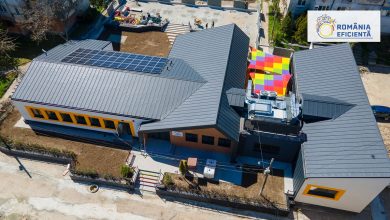Premiere in Romania: ‘Elie Radu’ Energy Technology High School Rehabilitated at NZEB Standard
OMV Petrom and Energy Policy Group (EPG) have completed on time and in budget the modernization and rehabilitation work at ‘Elie Radu’ Energy Technology High School from Ploiesti, as part of ‘Romania Eficienta’ program. The building has been rehabilitated at NZEB standard (nearly zero energy building), namely almost zero energy consumption. During the works in Ploiesti, the company Signify joined as sponsor and provided the ultramodern lighting system, while the Electrica Group contributed with the systems of photovoltaic panels.
The works performed will reduce the average yearly energy consumption of the building by approximately 60%. In addition, due to its photovoltaic and solar and thermal panels, the building could ensure its energy consumption, almost entirely during summer, out of its own sources.
This is a national premiere, as it is the first private investment of this kind and the largest renovation project at NZEB standards of a public school, with innovative technological solutions.
OMV Petrom funded the investment for the energy rehabilitation of the C10 building of the ‘Elie Radu’ Energy Technology High School from Ploiesti, which amounted to approximately 1 million euro.
“Buildings use approximately 45% of Romania’s energy consumption, as many of the buildings constructed before 1990 have an energy consumption 2-3 times higher than the modern ones. We have a huge opportunity for energy efficiency and the project for the rehabilitation of ‘Elie Radu’ high school stands for it. We can all contribute to a cleaner environment by adopting a more responsible behaviour towards energy consumption,” Christina Verchere, CEO of OMV Petrom, stated.
„When we launched the project ‘Romania Eficienta’, in June 2019, we committed to achieve a few profound renovations of certain schools in Romania, which should have a reference role in terms of renovation standards. We are happy with this first success by which we managed to turn this school building from Ploiesti into one with a very high energy performance, at nZEB standard, an extremely ambitious level which is generally less achieved in Europe. Beyond the substantial reductions of energy consumption which will be achieved, the pupils will have from now on a much healthier indoor environment suitable for school performance, as the classrooms are also equipped with air disinfection equipment,” Radu Dudau, Director of Energy Policy Group and coordinator of ‘Romania Eficienta’ Project, added.
The renovated building includes both classrooms, as well as a dormitory area, with a total deployed surface of approximately 1,500 square meters. About 250 pupils learn in the building and 60 teaching staff members carry out their activities. About 80 pupils are accommodated in the dormitory.
The renovation works started last summer and, to be brought to the NZEB standard, the building was equipped with best-performing equipment and high-quality materials.
Main energy rehabilitation works
- The thermal insulation of the external walls, the terrace and the flooring;
- The complete change of the existing woodwork with highly energy efficient woodwork;
- Modernization of the lighting system, by installing LED lighting, with high energy efficiency and long lifecycle, and the installation of a smart remote control lighting system – equipment provided by the sponsor Signify;
- Introduction of energy production equipment from renewable sources: photovoltaic panels (equipment provided by Electrica Group) and thermal solar panels;
- Replacement of pipes and radiators in the whole building;
- Installation of a household water heating system with thermal solar panels and its storage in boilers, so that the building is automatically decoupled from the thermal unit of the campus, each time the climate allows the heating of the water;
- Replacement of thermal agent columns for heating; replacement of all existing heating fixtures with new ones, made of steel, and their equipping with thermostatic taps, return adjustment taps, deaeration taps;
- Mounting of air filtration equipment with heat recovery and equipping the classrooms with air disinfection equipment, which will assure a healthier environment for pupils and teachers during the classes;
- Installation of shading devices in the extremely sunny windows;
- Full indoor rearrangement (finishes of floors/walls/ceilings fully reconstructed, new sanitary objects etc.), which increased the quality of comfort in the use of the building.
Nearly zero-energy buildings (NZEB)
The EU has proposed to move from the current nearly zero-energy buildings to zero-emission buildings by 2030.
Nearly zero-emission building (NZEB) means a building that has a very high energy performance, while the nearly zero or very low amount of energy required should be covered to a very significant extent by energy from renewable sources, including energy from renewable sources produced on-site or nearby.
The European Commission’s proposal to revise the Energy Performance of Buildings Directive (December 2021) makes a step forward from current NZEB to zero-emission building (ZEB), aligning the energy performance requirement for new buildings to the longer-term climate neutrality goal and “energy efficiency first principle”.
According to the directive’s proposal, a zero-emission building is defined as a building with a very high energy performance, with the very low amount of energy still required fully covered by energy from renewable sources and without on-site carbon emissions from fossil fuels.
The ZEB requirement should apply as of 1 January 2030 to all new buildings, and as of 1 January 2027 to all new buildings occupied or owned by public authorities.
While the focus of the proposal is the reduction of operational greenhouse gas emissions, ZEB definition further include the calculation life-cycle Global Warming Potential (GWP) and its disclosure through the energy performance certificate of the building. This requirement should apply as of 1 January 2027 for all new buildings with a useful floor area larger than 2000 square meters and as of 1 January 2030 for all new buildings.
About ‘Romania Eficienta’
‘Romania Eficienta’ is a private project of national scope carried out by Energy Policy Group (EPG) in partnership with and with financing of OMV Petrom. The project started in the summer of year 2019 and consist of carrying out a national programme for promotion of energy efficiency. ‘Romania Eficienta’ aims to support the achievement of Romania targets for 2030 about the reduction of carbon emissions and the increase in energy efficiency, both by awareness and education campaigns as well as by the achievement of concrete major renovation projects in public schools from various regions of the country.
About OMV Petrom
OMV Petrom is the largest integrated energy company in South-Eastern Europe, with an annual Group hydrocarbon production of approximately 47 million boe in 2021. The Group has a refining capacity of 4.5 million tons annually and operates an 860 MW high-efficiency power plant. The Group is present on the oil products retail market in Romania and neighbouring countries through more than 780 filling stations, under two brands – OMV and Petrom.
OMV Petrom shares are traded on the Bucharest Stock Exchange and the London Stock Exchange. OMV Aktiengesellschaft, one of the largest listed industrial companies in Austria, holds a 51% stake in OMV Petrom. The Romanian State, through the Ministry of Energy, holds 20.6% of OMV Petrom shares, and 28.4% is owned by natural and legal persons.
OMV Petrom is the largest contributor to the state budget, with approximately 35 billion euro in taxes and dividends paid between 2005 and 2021. During the same period, the company invested approximately 17 billion euro.
Since 2007, OMV Petrom has included corporate responsibility principles into its business strategy. Between 2007 and 2021, the company has allocated over 80 million euro to develop communities in Romania, focusing on environmental protection, education, health, and local development.
On July 29th, 2020, OMV Petrom announced its support for the recommendations issued by the Task Force on Climate-related Financial Disclosures (TCFD) regarding risks and opportunities on climate change.
About Energy Policy Group
Energy Policy Group Association (EPG) is an independent and non-profit think-tank, specialized in energy and climate policies, market analysis and energy strategy, founded in 2014. The regional focus of its activity is South-East Europe, but EPG pays a greater attention to the wider context of European policies and global trends, in the attempt to promote a constructive dialogue among the decision-makers and the general public.
EPG pleads for an advanced energy system from technological point of view, sustainable and socially acceptable. Also, EPG promotes long-term decarbonation policies and actions in all the economic fields, with emphasis on energy sector.


